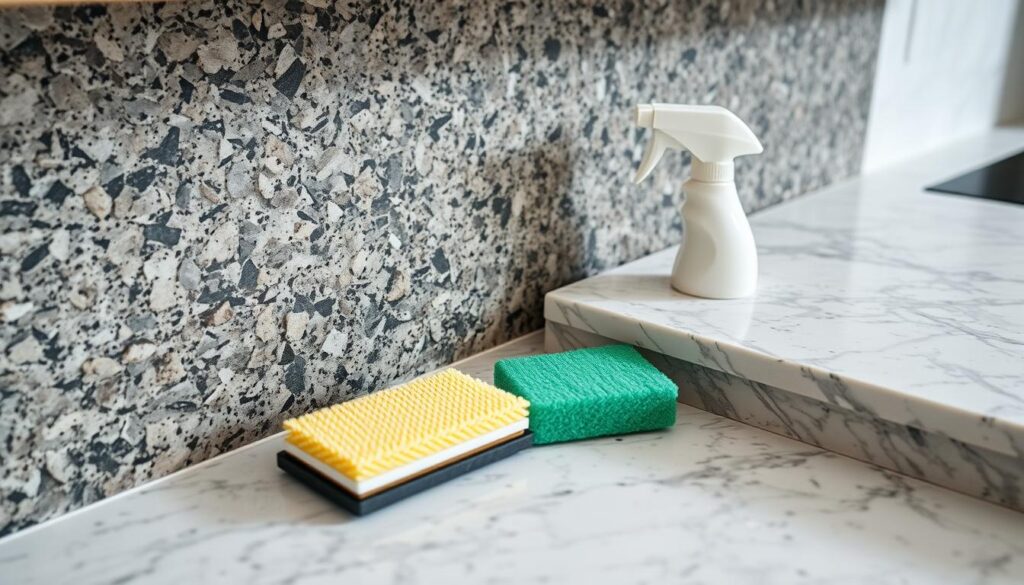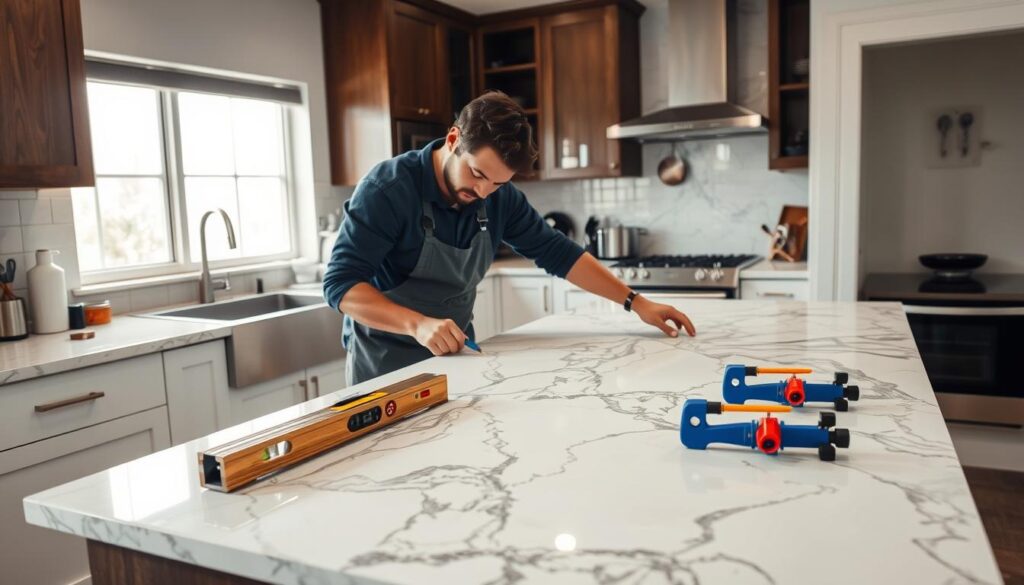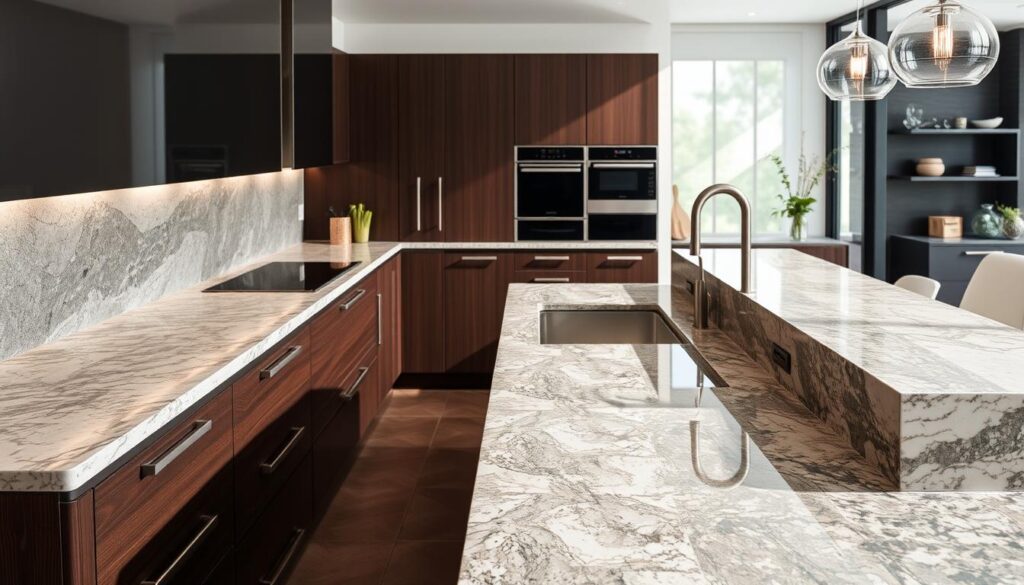Choosing the perfect kitchen countertop material is crucial for creating a space that is not only visually appealing but also highly functional and valuable. The countertop is often the centerpiece of the kitchen, influencing its overall aesthetic and usability. With a wide variety of materials available, ranging from luxurious natural stones like granite and marble to durable engineered surfaces like quartz and laminate, finding the right option can be a challenging task.
Each material comes with its own unique characteristics, benefits, and maintenance requirements, which can significantly impact your cooking experience and the longevity of your kitchen. This comprehensive guide will delve into the top countertop materials, highlighting their distinct features, pros and cons, and essential factors to consider when making your choice. Whether you’re aiming for a modern look, a rustic charm, or anything in between, the right countertop can elevate your kitchen to new heights.
Understanding Kitchen Countertop Materials
Choosing the right countertop material is key in kitchen renovations. It affects the look, function, and durability of your kitchen. You have many options, from classic natural stone to new engineered materials.
Natural vs. Engineered Materials
Natural stone countertops, like granite and marble, bring timeless beauty and a unique look. They are durable, heat-resistant, and resistant to scratches and stains. Engineered materials, such as quartz, offer a consistent look and better performance against stains and scratches.
Durability Factors to Consider
- Scratch resistance: Granite and quartz surfaces are highly scratch-resistant, making them ideal for busy kitchens.
- Heat tolerance: Natural stone countertops, like granite, can withstand high temperatures better than some engineered materials.
- Stain resistance: Quartz and other engineered options often have superior stain resistance compared to natural stone.
Cost Range Overview
The cost of kitchen countertops varies by material. Natural stone countertops, such as granite, cost between $40 to $100 per square foot installed. Engineered countertop materials, like quartz, usually cost between $50 to $120 per square foot. Knowing these costs is crucial for planning your kitchen renovation budget.
Choosing the right countertop material depends on your style, needs, and budget. By comparing natural and engineered options, you can find the best fit for your kitchen design and long-term use.
Granite Countertops: Classic Beauty and Durability
Granite is a top pick for kitchen countertops because of its timeless beauty and lasting durability. Each granite countertop is unique, with its own pattern and colors. This makes any kitchen look special, whether you want something bold or something more understated.
Granite is very hard and can handle scratches, chips, and cracks well. It’s perfect for busy kitchens because it can take a lot of use. Plus, it can handle hot pans without getting damaged.
But, granite needs regular sealing to keep it looking good and lasting long. Using the right cleaning products helps keep your granite looking beautiful for many years.
| Granite Countertop Advantages | Granite Countertop Considerations |
|---|---|
|
|
For those who love the classic look and durability of natural stone, granite is a great choice. Knowing how to care for granite ensures your kitchen stays beautiful and functional for a long time.
“Granite is the gold standard when it comes to kitchen countertops, offering a perfect balance of beauty and performance.”
Quartz Surfaces: The Modern Alternative
Homeowners looking for a stylish, easy-to-care-for kitchen countertop often choose quartz countertops. Quartz is a man-made stone that looks like natural stone but is more durable and consistent.
Benefits of Engineered Quartz
Quartz countertops are a great option for many reasons. They are highly durable and can withstand scratches. They also need little care to stay looking good. Unlike natural stone, quartz doesn’t soak up stains, bacteria, or moisture, making it perfect for kitchens that get a lot of use.
Color and Pattern Options
Engineered stone surfaces like quartz offer a wide range of color and pattern options. You can find quartz in many colors, from classic whites and grays to bold, vibrant shades. The patterns can also be customized, from solid colors to designs that look like natural stone.
Maintenance Requirements
Quartz countertops are very low-maintenance. They don’t need sealing or polishing, and spills can be cleaned with a damp cloth. This makes quartz a great choice for those who value convenience and don’t want to spend a lot of time on upkeep.
“Quartz is an excellent choice for homeowners who want the beauty of natural stone with the added benefits of a man-made material.”
Marble Countertops: Timeless Elegance
Marble countertops bring luxury and elegance to any kitchen. Their unique veining patterns make them stand out. Homeowners love them for their natural beauty.
Marble is stunning, but it needs special care. It can etch and stain, especially with acidic substances. Keeping it clean and sealed is key to its beauty.
To keep your marble looking great, clean it regularly and seal it often. Use gentle cleaners and wipe up spills fast. This helps avoid stains and damage.
“Marble countertops are a timeless investment that can transform the aesthetic of any kitchen. With proper care, they can maintain their elegant appeal for years to come.”
If you love marble but worry about damage, consider other options. Engineered quartz or high-end laminates offer beauty and durability.
| Marble Countertops | Pros | Cons |
|---|---|---|
| Timeless Elegance | Unique Veining Patterns | Susceptible to Etching and Staining |
| Natural Stone Material | Adds Luxury to Kitchen | Requires Diligent Maintenance |
| Wide Color Variations | Increases Home Value | Higher Cost Compared to Alternatives |
Budget-Friendly Kitchen Countertop Materials
Kitchen renovations can be pricey, especially for countertops. But, there are affordable options that are stylish and functional. Let’s look at some budget-friendly countertop materials.
Laminate Options
Laminate kitchen surfaces have improved a lot. They offer many designs that look like affordable countertops and concrete countertops. Laminate is durable and easy to clean, perfect for those watching their budget. It comes in many patterns and colors, helping you achieve your desired look without spending a lot.
Butcher Block Possibilities
Butcher block counters are a budget-friendly choice that adds warmth to your kitchen. They are affordable and practical, making them popular among cooks. Though they need more care than some materials, their unique charm is worth it.
Concrete Solutions
Concrete countertops can be surprisingly affordable for kitchen updates. While custom concrete can be expensive, DIY or prefabricated options offer a modern look at lower cost. Concrete is tough, easy to clean, and can be finished in many ways to match your style.
Choosing budget-friendly countertops means considering each option’s pros and cons. With some research and creativity, you can find an affordable option that makes your kitchen look great without spending too much.
Maintenance and Durability Comparison
Kitchen countertops need to be easy to care for and last a long time. Different materials have different needs to stay looking good and working well. Let’s look at how to keep some popular countertops in top shape.
Granite Countertops: Granite is very tough and can handle scratches, stains, and heat. But, it needs to be sealed every one to two years to keep it looking nice. Clean it with a gentle, pH-neutral cleaner to keep the surface in good condition.
Quartz Surfaces: Quartz countertops are easy to take care of. They resist scratches, stains, and heat well. Just clean them with a soft, mild soap and water now and then to keep them looking great.
Marble Countertops: Marble is elegant but needs more care than granite or quartz. It can get etched by acidic things and stain if not sealed right. Seal marble every six months to a year to keep it beautiful.
Laminate countertops are cheap and easy to clean but not as tough as stone. Butcher block needs oiling often to avoid cracking and warping. Concrete can be sealed and polished to make it last longer.
| Countertop Material | Maintenance Requirements | Durability |
|---|---|---|
| Granite | Regular sealing (1-2 years) | Highly scratch and stain resistant |
| Quartz | Periodic cleaning with mild soap and water | Extremely durable, resistant to scratches and stains |
| Marble | Frequent sealing (every 6 months to 1 year) | More delicate, susceptible to etching and staining |
| Laminate | Easy to clean and maintain | Less durable than natural or engineered stone |
| Butcher Block | Requires regular oiling and conditioning | Can be prone to cracking and warping if not properly maintained |
| Concrete | Sealing and polishing can enhance longevity | Durable, but can be susceptible to stains and cracks if not properly sealed |
Choosing the right countertop means thinking about looks, care, and durability. Your kitchen should stay beautiful and functional for many years.

Design Considerations and Color Selection
Choosing the right countertop material is more than just about looks. It’s about how it fits with the kitchen’s style. Homeowners need to think about current trends, color choices, and matching with cabinets.
Matching with Cabinet Styles
The countertop material greatly affects the kitchen’s look. For example, modern cabinets work well with quartz or solid surfaces. On the other hand, granite or marble suits traditional or rustic cabinets better.
Color Psychology in Kitchen Design
The countertop color sets the mood of the kitchen. Warm colors like beige make the space cozy. Cool colors like gray or white give it a sleek look. Think about how the color will match the kitchen’s overall look and lighting.
Pattern and Texture Impact
The countertop’s pattern and texture also matter. Simple patterns make the kitchen look clean. Natural stone with veining adds elegance. The texture, whether smooth or matte, affects the kitchen’s feel.
By paying attention to these details, homeowners can make a kitchen that looks great and works well. It should reflect their style and enhance the space’s beauty.
| Countertop Material | Recommended Cabinet Styles | Color Palette | Pattern and Texture |
|---|---|---|---|
| Granite | Traditional, Rustic | Earthy, Neutral | Unique, Natural Variations |
| Quartz | Modern, Transitional | Sleek, Monochromatic | Uniform, Minimal |
| Marble | Classic, Elegant | Timeless, Sophisticated | Veined, Polished |
| Laminate | Casual, Budget-Friendly | Versatile, Patterned | Consistent, Smooth |
Installation Process and Cost Factors
Choosing the right countertop for your kitchen involves several important considerations. The installation process can differ based on the material and whether you choose to do it yourself or hire a professional. Let’s dive into the details:
Professional Countertop Installation
For materials like granite, quartz, or marble, it’s best to get professional help. This ensures a smooth and lasting finish. It also means your edges and cuts are done right. The cost for countertop installation by pros can be between $50 and $150 per square foot. This price depends on the material and how complex the job is.
DIY Countertop Installation
Some people might want to install their countertops themselves, especially if they’re using laminate or butcher block. But, think about your skills and tools first. The wrong installation can cause problems later. DIY costs can be lower, from $20 to $50 per square foot. But, you’ll also need to buy the material.
Additional Cost Considerations
There are other costs to consider besides the material and installation. These include:
- Edge treatments (e.g., bullnose, eased, or custom edges)
- Backsplash installation
- Sink and faucet cutouts
- Demolition and disposal of old countertops
Remember to include these extra costs in your budget for your kitchen countertop project.

The cost and process of countertop installation depend on your material choice, customization needs, and whether you install it yourself or hire a pro. Thinking carefully about these factors can help make your kitchen remodel successful and affordable.
Conclusion
Choosing the right kitchen countertop material is key. It affects your kitchen’s look, feel, and how well it works. You have many options, like granite, quartz, and marble. Think about choosing kitchen countertops, countertop material comparison, and kitchen remodel decision-making.
Each material has its own good points and bad. Granite is classic and timeless, while quartz is modern and easy to care for. Think about what you need and what you like. This helps you pick the best material for your kitchen.
For a great kitchen remodel, balance is important. This means finding a material that looks good, works well, and fits your budget. This article has helped you understand kitchen countertops better. Now, you can make a choice that will last for many years.
FAQ
What are the most popular kitchen countertop materials?
The top choices are granite, quartz, marble, laminate, butcher block, and concrete.
What factors should I consider when choosing a kitchen countertop material?
Think about durability, upkeep, looks, and cost. Consider scratch, heat, and stain resistance to match your kitchen.
What are the benefits of granite countertops?
Granite is known for its timeless beauty, toughness, and ability to withstand heat. It’s prized for its unique colors and durability.
How do quartz countertops compare to natural stone?
Quartz is a man-made option that rivals natural stone. It comes in many colors and patterns, needing little upkeep.
What are the drawbacks of marble countertops?
Marble can etch and stain easily, needing careful care. It’s not ideal for busy kitchens.
What are some budget-friendly countertop options?
Laminate, butcher block, and concrete are cheaper but still stylish and practical for kitchens.
How do I match my countertops with my kitchen cabinets?
Choose countertops that complement your cabinets’ style and color. Think about the overall look you want in your kitchen.
What is the typical installation process for kitchen countertops?
The process depends on the material. It includes measuring, cutting, and installing. Hiring pros ensures a smooth, lasting finish.


